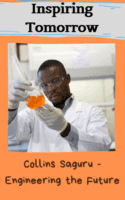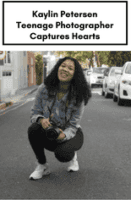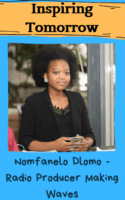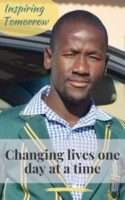Take a dash of efficiency, planning and ingenuity, add a couple of grams of entrepreneurship, dip this in education and a strong belief in God. These are some of the ingredients that make up the man that is Collins Saguru.
Born in Zimbabwe to a family of scholars – his father has an MBA and is part-time lecturer, and his mother is a teacher with a degree in accounting – Collins had the foundation to succeed in life.
“I am the only male, first born in a family of 3 with 2 girls. I am not born to a rich family, but I cannot also say we lacked growing up. I went to a modest missionary school where I sat and completed my Ordinary and Advanced level exams in 2006 and 2008, securing a place for a Bachelor of Honours degree in Chemical Engineering which I started in 2010 after taking a gap year.”
This was during the time that Zimbabwe was facing the worst economic year and students often went without all their meals at the boarding school he attended. But through all this, Collins persevered and held his own.
After graduating, he chose to study Chemical Engineering but, ‘for all the wrong reasons!’
“I was good in chemistry when I was at high school but I also wanted to do engineering – just because I wanted to be called an engineer. It made sense to choose Chemical Engineering. But I only found out when doing the degree that engineering was completely different from the sciences and, more importantly, that I loved and enjoyed engineering more than I would have chemistry as a degree.”
Even though he did chemical engineering at university, he taught himself website design to generate extra money.
“I started developing websites for schools and that venture flopped after getting maybe 2 or 3 clients. I moved on to developing an online directory for schools, and that too flopped, because the schools in my area didn’t yet appreciate the need for an online presence.”
Although these entrepreneurial ventures didn’t succeed, they didn’t stop Collins from improving himself and growing his knowledge as an entrepreneur.
“Engineering taught me to look at systems (or processes) in a holistic way; to look at a system and see how all the moving parts coordinate to work together. How each individual piece in a process is related to the end goal, and how to move and rearrange pieces of a system to improve that system. This was a more exciting challenge to me than the challenges science alone had presented.”
And these challenges only strengthened his entrepreneurial mind and resolve and he was able to see great potential (moving parts) in the research he was working on from a commercial perspective. Towards the end of 2016 he entered the Africa Prize for Engineering Innovation (APIE) 2017 – 2018. The competition aimed to nurture engineering-inspired enterprises and celebrate young African entrepreneurs. Out of 16 original entrants, Collins walked away with the finalist grant, which he invested into his new start-up company AltMet.
“The experience was beautiful, enlightening, encouraging and very beneficial. It made me stop looking at the project as an academic exercise, but rather as a commercial enterprise with the potential to grow the SA economy and create much needed jobs. It introduced me to a new style of presentations; pitching. This developed a skill in me to articulate a complex series of ideas in just 3 minutes, and do so in the simplest possible way.”
But great entrepreneurs do not forget the reason why they do what they do – to uplift communities and help combat and solve societal problems.
“I have taught many classes and interacted with many students throughout my term in SA. And in all my engagements I have met some exceptional students, some of which I helped by applying to Wits because they didn’t have access to internet or online application portals. It is their potential that pushed me to act. I believe the narrative that science/chemistry/maths are difficult has been sold and bought, and lowering the pass rates hasn’t made it any better as some students feel they only need to reach those standards to pass – hence do not put in the work. I strongly believe it’s an attitude problem, which if fixed, has immense potential to do improve the literacy levels in the republic.”
Collins has a vision of a bright and sustainable future for our energy crisis. He is looking at alternative waste resources and recycling from end of life (waste) material. He strongly believes our African rural areas (and high density areas) which lack access to energy, access to clean water, decent communication, access to food, and financial exclusion, can best be solved by people who come from these rural areas.
“I strongly believe young people from rural areas SHOULD have careers in the engineering sector. Engineering (at least chemical engineering) equips you with the skills to look at the environment around you and develop solutions for the challenges around you. These challenges [in rural areas] can only be solved by students who come from the rural areas; they understand their areas better because they grew up there. Equipped with valuable engineering knowledge, they are better suited to proffer more pragmatic solutions compared to anyone else. They have the context, and appreciate everything about their homesteads. That is how Africa develops its most backward areas.”
Here are more links to various presentations, talks, articles about Collins:
• The company founder, Collins, was interviewed by David for the Breakfast show with David on Khaya FM (https://www.kayafm.co.za/breakfast-with-david-podcasts/)
• Collins was also featured on CNBC Africa’s show called Power Lunch on. The conversation is presented on (https://www.cnbcafrica.com/videos/2018/05/29/zimbabwean-innovator-shortlisted-for-engineering-innovation-prize/)
• Collins was also nominated for the CNBC All Africa Business Leaders Awards 2018, Southern Africa edition, under the category of Innovator of the year. The nomination came with some significant media exposure.
• AltMet was featured in an article in Fin24, which is available on the following link (https://www.fin24.com/Finweek/Featured/making-money-from-scrap-metal-20180703)
This drew the attention of representatives from some companies, who reached out and we had a few conversations. They mentioned they could be interested in later investments and product off take. The article also opened up conversations with potential VCs for follow on funding.
• AltMet has been featured in a few other local newspapers as well e.g (http://m.engineeringnews.co.za/article/south-african-engineers-invited-to-enter-africa-prize-for-engineering-innovation-programme-2018-07-16) and regional online publications (https://www.chronicle.co.zw/zim-engineer-scores-a-first/).
• AltMet has been represented at the Pitch@Palace competition in London, where we were fortunate to present to an audience that included Prince Andrew at St James Palace on 28 February 2018 (https://www.youtube.com/watch?v=nRYzur8kttY&t=58s).
•The company was also represented in international publications e.g. in Recycling International (https://recyclinginternational.com/business/platinum-group-metals-innovation-from-south-africa/).
Recycling International is the biggest online publication focused on global recycling news.
• The company also has an active online presence with a website (www.altmet.co.za/pgm-overview), twitter account (www.twitter.com/altmet_SA) and Linkedin account (www.linkedin.com/companies/altmet)





